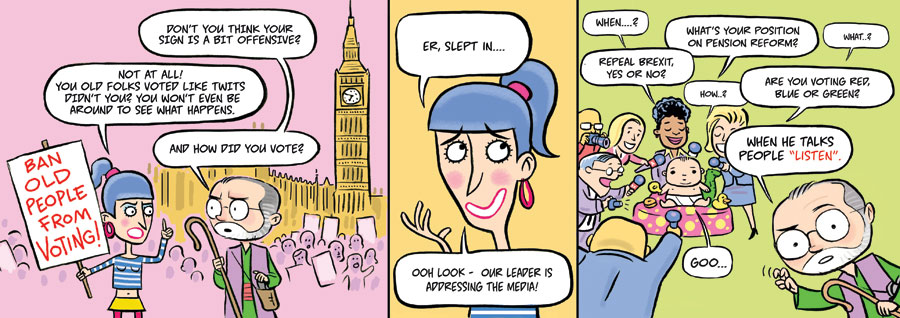Prophet of Zoom: Not Again? Yes, Again!

Brexit and the Age-Libel.
For me, the most troubling development following the historic Brexit referendum this past June 23 (in which Britons voted to leave the European Union 52 per cent to 48 per cent) was the almost immediate rush to blame “old” people for the vote. No sooner had a few objective journalistic overviews reported that a majority of the 65-plus had voted Leave than the Twitterverse exploded, followed, surprisingly, by the mainstream press, with this twist: in voting Leave, it was alleged, older Britons, driven by ignorance, cynicism and racism, had sold out their younger cosmopolitan counterparts who stood to lose the most without the EU. One particularly vile example of the Generation Blame Game was a piece on vice.com by a certain Joel Golby, which had the line “Oh my god, Grandma, what the f%*# have you done?” Besides reviling his grandma’s “little wrinkly face,” Golby claimed that the older generation was solely responsible for the referendum result, thereby dooming the young. Similar arguments soon appeared in The Guardian, the Telegraph and Vox.com.
Why so much anti-old bile so fast? Maybe because so many “experts” had miscalculated the outcome so badly, and they needed a handy villain. And who is handier than us, given that ageism seems to be the last “ism” that can be evoked with impunity? But it turns out that the biggest miscalculation the experts made wasn’t before the vote but after, and in some pretty basic math at that.

The “problem” wasn’t that the 65-plus crowd cast so many Leave votes; in fact, they cast almost two million more Remain votes than the “yuff” demographic. The “problem” was that the British old, like our old, vote so much more in general. According to Sean O’Meara, a former Huffington Post and BBC contributor, who used Sky Data and YouGov Brexit polls and one commissioned by Lord Ashcroft, 83 per cent of the 65-plus voted, compared to only 36 per cent of the 18-24s. Had the 18-24 turnout matched the 65-plus turnout and the same preferences held, Remain would have won by a million votes, instead of losing by a million and a half votes. Even if the 18-24s had managed only a 65 per cent turnout, Remain would still have won a narrow victory. But two-thirds of those most drastically affected by this referendum (according to their own assessment), chose to do nothing about the most important vote in generations. “If you’re 18 to 24 and angry,” O’Meara says, “[don’t blame Granny] blame your mates who didn’t vote.”
I have two more Brexit objections. First, the willingness of many to believe the predatory characterization of Grandma’s cohort as those who would callously devour their young. As Eric Worral of wattsupwiththat.com wrote, “Most old people I know would throw themselves into a fire if they thought it would somehow improve the lives of their grandkids. Claiming old people en masse do not care about the young is utterly obscene.” Hear, hear! We’ve been calling out this lie of a “war” between young and old for many years.
Second, a dangerously wacky idea that’s cropped up all over post-Brexit – imposing a reverse age limit on voting. The older you get, goes the argument, the less your vote should count because you’ll be dead before the full effects of that vote unfold. Thus a 65-year-old might only have 20 more years to live, compared to a 25-year-old who has 60 (plus or minus) years to go. Mind you, a 15-year-old could have 70 or 80 years ahead and a 10-year-old 90. And what about the sick? Should they be denied the vote because they might not last?
As boomers, we only suggested not trusting anyone over 30. Now here’s a new low. Ladies and gentlemen, I present your 21st-century only legitimate electorate: five years old and younger.